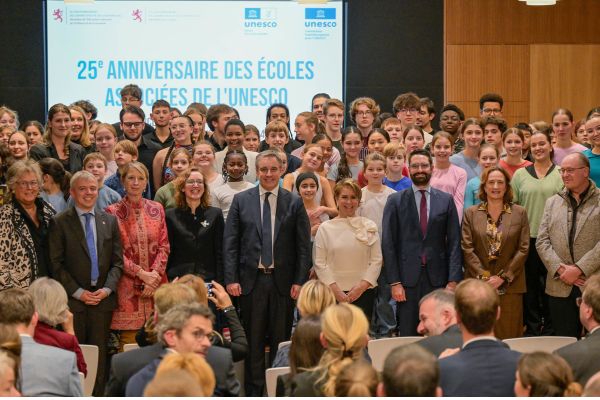 Credit: MENEJ
Credit: MENEJ
On Thursday 28 November 2024, the UNESCO Associated Schools Network in Luxembourg celebrated its 25th anniversary at an academic session in Mondorf-les-Bains.
The celebration took place in the presence of Luxembourg’s Grand Duchess, Maria Teresa, the Minister of Education, Children and Youth, Claude Meisch, and the Minister of Culture, Eric Thill.
Through performances and presentations, students from the UNESCO-associated schools in Luxembourg led the academic session and demonstrated the extent of their schools’ commitment to UNESCO values.
Created in 1953 and driven by teachers committed to a humanist and international vision of education, the UNESCO Associated Schools Network now brings together more than 12,000 member schools in 182 countries. As reported by Luxembourg’s Ministry of Education and Ministry of Culture, the common goal, around which these schools come together, is to build the defences of peace in the minds of children and young people. Since its inception, the network has defended rights and dignity, gender equality, social progress, freedom, justice and democracy, respect for diversity and international solidarity.
In 1999, the Mondorf-les-Bains primary school was the first Luxembourg school to become a UNESCO school. Currently, sixteen schools are part of the Luxembourg network: four primary schools; eleven secondary schools and one international public school. They contribute to promoting UNESCO values, such as the preservation of tangible and intangible cultural heritage as well as education in human rights, sustainable development, media, digital technology and living together in diversity.
To become a member of the UNESCO Associated Schools Network, interested schools must submit a large-scale project on the network’s educational priorities. Each year, the network members must conduct a project in their school in one of the following areas: living together in diversity; risks and opportunities of the digital age; knowledge of tangible and intangible heritage; education for sustainable development and global citizenship; human rights education. The project may involve a class or a group of students and the school undertakes to present it to the entire school community (e.g. through an exhibition).
Network members regularly exchange ideas on their respective projects or on projects to be implemented within the network and which involve several schools. Examples of this are the joint participation in the Bildung fir nohalteg Entwécklung (BNE) fair and in the dancing procession of Echternach.








